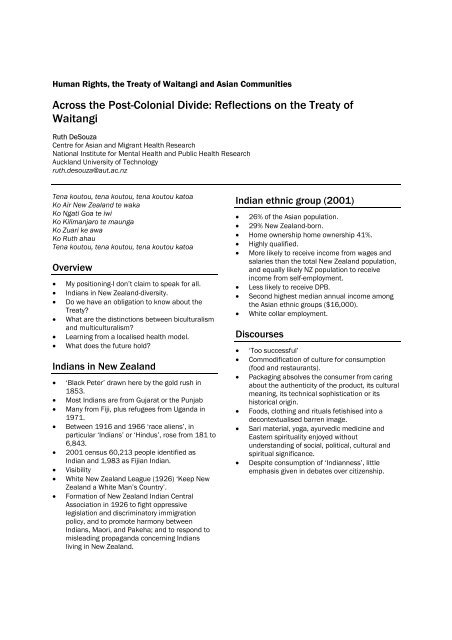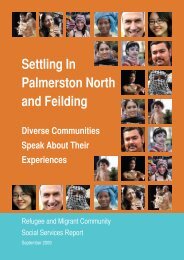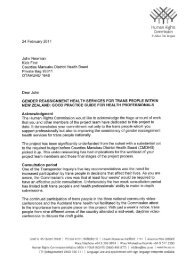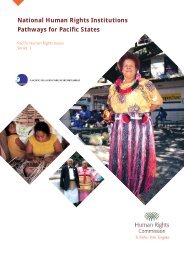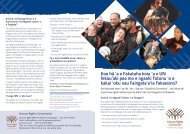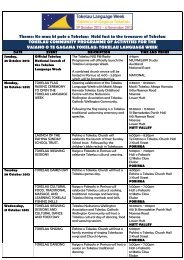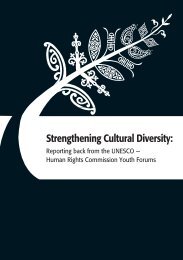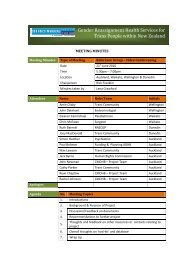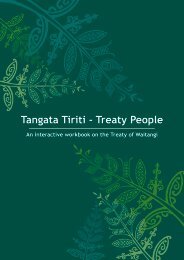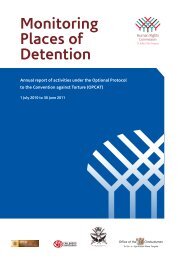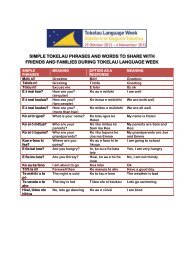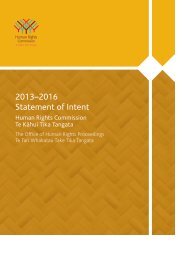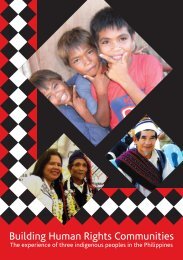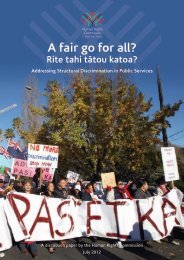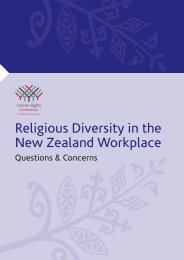Across the Post-Colonial Divide: Reflections on the Treaty of Waitangi
Across the Post-Colonial Divide: Reflections on the Treaty of Waitangi
Across the Post-Colonial Divide: Reflections on the Treaty of Waitangi
Create successful ePaper yourself
Turn your PDF publications into a flip-book with our unique Google optimized e-Paper software.
Human Rights, <str<strong>on</strong>g>the</str<strong>on</strong>g> <strong>Treaty</strong> <strong>of</strong> <strong>Waitangi</strong> and Asian Communities<br />
<str<strong>on</strong>g>Across</str<strong>on</strong>g> <str<strong>on</strong>g>the</str<strong>on</strong>g> <str<strong>on</strong>g>Post</str<strong>on</strong>g>-<str<strong>on</strong>g>Col<strong>on</strong>ial</str<strong>on</strong>g> <str<strong>on</strong>g>Divide</str<strong>on</strong>g>: <str<strong>on</strong>g>Reflecti<strong>on</strong>s</str<strong>on</strong>g> <strong>on</strong> <str<strong>on</strong>g>the</str<strong>on</strong>g> <strong>Treaty</strong> <strong>of</strong><br />
<strong>Waitangi</strong><br />
Ruth DeSouza<br />
Centre for Asian and Migrant Health Research<br />
Nati<strong>on</strong>al Institute for Mental Health and Public Health Research<br />
Auckland University <strong>of</strong> Technology<br />
ruth.desouza@aut.ac.nz<br />
Tena koutou, tena koutou, tena koutou katoa<br />
Ko Air New Zealand te waka<br />
Ko Ngati Goa te iwi<br />
Ko Kilimanjaro te maunga<br />
Ko Zuari ke awa<br />
Ko Ruth ahau<br />
Tena koutou, tena koutou, tena koutou katoa<br />
Overview<br />
• My positi<strong>on</strong>ing-I d<strong>on</strong>’t claim to speak for all.<br />
• Indians in New Zealand-diversity.<br />
• Do we have an obligati<strong>on</strong> to know about <str<strong>on</strong>g>the</str<strong>on</strong>g><br />
<strong>Treaty</strong><br />
• What are <str<strong>on</strong>g>the</str<strong>on</strong>g> distincti<strong>on</strong>s between biculturalism<br />
and multiculturalism<br />
• Learning from a localised health model.<br />
• What does <str<strong>on</strong>g>the</str<strong>on</strong>g> future hold<br />
Indians in New Zealand<br />
• ‘Black Peter’ drawn here by <str<strong>on</strong>g>the</str<strong>on</strong>g> gold rush in<br />
1853.<br />
• Most Indians are from Gujarat or <str<strong>on</strong>g>the</str<strong>on</strong>g> Punjab<br />
• Many from Fiji, plus refugees from Uganda in<br />
1971.<br />
• Between 1916 and 1966 ‘race aliens’, in<br />
particular ‘Indians’ or ‘Hindus’, rose from 181 to<br />
6,843.<br />
• 2001 census 60,213 people identified as<br />
Indian and 1,983 as Fijian Indian.<br />
• Visibility<br />
• White New Zealand League (1926) ‘Keep New<br />
Zealand a White Man’s Country’.<br />
• Formati<strong>on</strong> <strong>of</strong> New Zealand Indian Central<br />
Associati<strong>on</strong> in 1926 to fight oppressive<br />
legislati<strong>on</strong> and discriminatory immigrati<strong>on</strong><br />
policy, and to promote harm<strong>on</strong>y between<br />
Indians, Maori, and Pakeha; and to resp<strong>on</strong>d to<br />
misleading propaganda c<strong>on</strong>cerning Indians<br />
living in New Zealand.<br />
Indian ethnic group (2001)<br />
• 26% <strong>of</strong> <str<strong>on</strong>g>the</str<strong>on</strong>g> Asian populati<strong>on</strong>.<br />
• 29% New Zealand-born.<br />
• Home ownership home ownership 41%.<br />
• Highly qualified.<br />
• More likely to receive income from wages and<br />
salaries than <str<strong>on</strong>g>the</str<strong>on</strong>g> total New Zealand populati<strong>on</strong>,<br />
and equally likely NZ populati<strong>on</strong> to receive<br />
income from self-employment.<br />
• Less likely to receive DPB.<br />
• Sec<strong>on</strong>d highest median annual income am<strong>on</strong>g<br />
<str<strong>on</strong>g>the</str<strong>on</strong>g> Asian ethnic groups ($16,000).<br />
• White collar employment.<br />
Discourses<br />
• ‘Too successful’<br />
• Commodificati<strong>on</strong> <strong>of</strong> culture for c<strong>on</strong>sumpti<strong>on</strong><br />
(food and restaurants).<br />
• Packaging absolves <str<strong>on</strong>g>the</str<strong>on</strong>g> c<strong>on</strong>sumer from caring<br />
about <str<strong>on</strong>g>the</str<strong>on</strong>g> au<str<strong>on</strong>g>the</str<strong>on</strong>g>nticity <strong>of</strong> <str<strong>on</strong>g>the</str<strong>on</strong>g> product, its cultural<br />
meaning, its technical sophisticati<strong>on</strong> or its<br />
historical origin.<br />
• Foods, clothing and rituals fetishised into a<br />
dec<strong>on</strong>textualised barren image.<br />
• Sari material, yoga, ayurvedic medicine and<br />
Eastern spirituality enjoyed without<br />
understanding <strong>of</strong> social, political, cultural and<br />
spiritual significance.<br />
• Despite c<strong>on</strong>sumpti<strong>on</strong> <strong>of</strong> ‘Indianness’, little<br />
emphasis given in debates over citizenship.
Ruth DeSouza<br />
Resp<strong>on</strong>sibilities <strong>of</strong> migrants<br />
• ‘Success’ in new home.<br />
• Preservati<strong>on</strong> and maintenance <strong>of</strong> culture.<br />
• How does understanding history help those two<br />
aims<br />
• Can we relate effectively to a history that is not<br />
our own Can we care for this country without<br />
identifying with <str<strong>on</strong>g>the</str<strong>on</strong>g> past<br />
• Can we ethically bel<strong>on</strong>g to New Zealand without<br />
an ethical relati<strong>on</strong>ship to New Zealand’s history<br />
<strong>of</strong> col<strong>on</strong>isati<strong>on</strong><br />
• If we <str<strong>on</strong>g>the</str<strong>on</strong>g>n work <strong>on</strong> having an ethical relati<strong>on</strong>ship<br />
with <str<strong>on</strong>g>the</str<strong>on</strong>g> <strong>Treaty</strong> partners and get nothing back<br />
what is <str<strong>on</strong>g>the</str<strong>on</strong>g> point<br />
Tensi<strong>on</strong>s between Bicultural and<br />
multicultural<br />
• Normative biculturalism.<br />
• Pragmatic multiculturalism.<br />
• Systems remain largely m<strong>on</strong>o-cultural with<br />
occasi<strong>on</strong>al c<strong>on</strong>cessi<strong>on</strong> to difference.<br />
• Lack <strong>of</strong> c<strong>on</strong>sultati<strong>on</strong> with Maori and Pakeha<br />
about migrati<strong>on</strong>.<br />
• Lack <strong>of</strong> dialogue prevents <str<strong>on</strong>g>the</str<strong>on</strong>g> incorporati<strong>on</strong> <strong>of</strong><br />
new arrivals and <str<strong>on</strong>g>the</str<strong>on</strong>g> cohesi<strong>on</strong> <strong>of</strong> our society.<br />
• No <strong>on</strong>us <strong>on</strong> immigrants to extend <str<strong>on</strong>g>the</str<strong>on</strong>g>ir loyalty<br />
Lack <strong>of</strong> development <strong>of</strong> multicultural<br />
• Migrati<strong>on</strong> source countries shaped activities<br />
and c<strong>on</strong>cerns.<br />
• Issues <strong>of</strong> indigeneity and relati<strong>on</strong>ship with<br />
Tangata whenua debated.<br />
• Specific rights afforded to Māori under Article<br />
two <strong>of</strong> <str<strong>on</strong>g>the</str<strong>on</strong>g> <strong>Treaty</strong> relating to resources.<br />
• Addressing <strong>of</strong> historical grievances.<br />
• Linking bicultural and multicultural<br />
• Outcome <strong>of</strong> a network <strong>of</strong> completed bicultural<br />
negotiati<strong>on</strong>s.<br />
• No process suggested.<br />
• C<strong>on</strong>cern that Maori become first migrants and<br />
lose Tangata whenua status.<br />
• Maori and Pakeha threatened.<br />
Biculturalism and multiculturalism<br />
Bicultural<br />
• Nati<strong>on</strong>al minorities<br />
• Self-government and sovereignty.<br />
• Māori prior sovereignty and <strong>Treaty</strong> allows for<br />
aut<strong>on</strong>omy, self-determinati<strong>on</strong> and free and full<br />
development.<br />
• Decol<strong>on</strong>isati<strong>on</strong><br />
• Article two<br />
• Preamble<br />
Multicultural<br />
• Ethnic minorities<br />
• Polyethnic rights<br />
• Civic nati<strong>on</strong>alism-<br />
• Nati<strong>on</strong>al identity is shared equally by citizens<br />
regardless <strong>of</strong> origin<br />
• Preservati<strong>on</strong> <strong>of</strong> identity, which leads to<br />
wellbeing and integrati<strong>on</strong><br />
• Anti-racism<br />
• Article three<br />
Impact<br />
• Silos<br />
• Limited inter-cultural engagement<br />
• Co-existence versus Interacti<strong>on</strong><br />
• Withdrawal<br />
• Poor access<br />
• Under-ultilisati<strong>on</strong> <strong>of</strong> services<br />
A way forward<br />
• Locally relevant resp<strong>on</strong>se to cultural diversity<br />
that complements or expands <strong>on</strong> <str<strong>on</strong>g>the</str<strong>on</strong>g> bicultural<br />
(Māori and Pākehā) and <strong>Treaty</strong> <strong>of</strong> <strong>Waitangi</strong><br />
initiatives that have occurred (Bartley &<br />
Spo<strong>on</strong>ley, 2004).<br />
• Secti<strong>on</strong> 20 <strong>of</strong> <str<strong>on</strong>g>the</str<strong>on</strong>g> New Zealand Bill <strong>of</strong> Rights Act<br />
1990 (enjoy culture, pr<strong>of</strong>ess and practice<br />
religi<strong>on</strong>, use own language).
Ruth DeSouza<br />
Cultural safety<br />
• Developed by Māori nurses in <str<strong>on</strong>g>the</str<strong>on</strong>g> 80’s.<br />
• C<strong>on</strong>ceptual framework for understanding power<br />
inequalities structuring relati<strong>on</strong>ships and<br />
practical strategies.<br />
• Requires that all human being receive care that<br />
takes into account <str<strong>on</strong>g>the</str<strong>on</strong>g>ir uniqueness (culture,<br />
gender, religious backgrounds)<br />
• Not a checklist <strong>of</strong> customs or practices<br />
• Focused <strong>on</strong> knowledge and understanding <strong>of</strong><br />
<str<strong>on</strong>g>the</str<strong>on</strong>g> individual nurse/midwife<br />
• Important to understand <strong>on</strong>e’s own culture and<br />
<str<strong>on</strong>g>the</str<strong>on</strong>g>ory <strong>of</strong> power relati<strong>on</strong>s<br />
Four principles<br />
• Improve <str<strong>on</strong>g>the</str<strong>on</strong>g> health status <strong>of</strong> New Zealanders<br />
(<strong>Treaty</strong>, access, health gain <strong>of</strong> marginalised<br />
groups).<br />
• Enhance <str<strong>on</strong>g>the</str<strong>on</strong>g> delivery <strong>of</strong> services through a<br />
culturally safe workforce (power relati<strong>on</strong>ships,<br />
empowering users, understanding diversity in<br />
own c<strong>on</strong>text and <str<strong>on</strong>g>the</str<strong>on</strong>g> impact <strong>of</strong> that, going<br />
bey<strong>on</strong>d tasks to relati<strong>on</strong>ships).<br />
• Broad applicati<strong>on</strong> recognising impact <strong>of</strong> c<strong>on</strong>text<br />
(inequalities as a microcosm, impact <strong>of</strong> history,<br />
employment etc, legitimacy <strong>of</strong> difference,<br />
attitudes as barriers, quality improvement and<br />
rights).<br />
• Close focus <strong>on</strong> individual nurse (culture bearer,<br />
power relati<strong>on</strong>ships which favour providers,<br />
balancing power differentials, moving towards<br />
equitable delivery and minimising risk to<br />
marginalised).<br />
Simply put<br />
• Culturally safe<br />
• Recognise<br />
• Respect<br />
• Rights<br />
Implementati<strong>on</strong><br />
• <strong>Treaty</strong> <strong>of</strong> <strong>Waitangi</strong> pivotal for resource allocati<strong>on</strong><br />
for Maori.<br />
• Compulsory in nursing educati<strong>on</strong> for <str<strong>on</strong>g>the</str<strong>on</strong>g> last ten<br />
years.<br />
• Driven by educati<strong>on</strong> providers ra<str<strong>on</strong>g>the</str<strong>on</strong>g>r than<br />
service providers with little impact <strong>on</strong> negative<br />
Maori health outcomes<br />
Steps<br />
• Cultural awareness: understanding that <str<strong>on</strong>g>the</str<strong>on</strong>g>re is<br />
difference.<br />
• Cultural sensitivity: alerts to <str<strong>on</strong>g>the</str<strong>on</strong>g> ‘legitimacy <strong>of</strong><br />
difference’ and to self-explorati<strong>on</strong>.<br />
• Cultural safety: enables safe service to be<br />
defined by those that receive <str<strong>on</strong>g>the</str<strong>on</strong>g> service.<br />
Health<br />
• Labels have implicati<strong>on</strong>s for resource allocati<strong>on</strong>.<br />
• MC and BC not mutually exclusive.<br />
• CS can hold both but has focused <strong>on</strong> Maori.<br />
• Need for expansi<strong>on</strong> <strong>of</strong> cultural safety.<br />
• Understanding self, <str<strong>on</strong>g>the</str<strong>on</strong>g> rights <strong>of</strong> o<str<strong>on</strong>g>the</str<strong>on</strong>g>rs and <str<strong>on</strong>g>the</str<strong>on</strong>g><br />
legitimacy <strong>of</strong> difference should prepare <str<strong>on</strong>g>the</str<strong>on</strong>g><br />
nurse to work with all people who are different<br />
from <str<strong>on</strong>g>the</str<strong>on</strong>g>mselves (Nursing Council).<br />
• Need for <strong>on</strong>going dialogue and discussi<strong>on</strong>.<br />
C<strong>on</strong>clusi<strong>on</strong><br />
• The ethical relati<strong>on</strong>ship needs to go both ways,<br />
try understanding our history our hopes and our<br />
dreams, make space for us.<br />
• The c<strong>on</strong>sumpti<strong>on</strong> <strong>of</strong> Indian ness needs to be<br />
supplemented with understanding <strong>of</strong> social,<br />
political, cultural and spiritual significance and<br />
political power.<br />
• Expand bicultural dialogue.<br />
• Need for intercultural engagement.<br />
• Need for a visi<strong>on</strong> <strong>of</strong> Aotearoa/New Zealand.<br />
• Develop multicultural policy that is sensitive to<br />
bicultural issues and Maori.<br />
• Cultural safety an example


